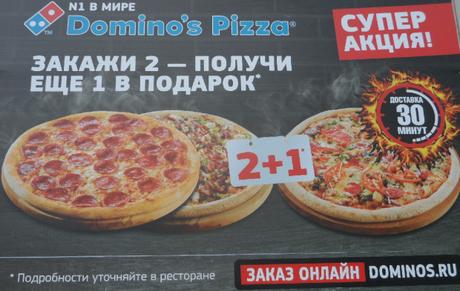There is a popular Russian joke that goes: " Unlike here in Mother Russia, those poor Americans have to wait until the votes are counted to know who won. "
There is a truckload of truth in that humour as elections in Russia have become much like elections in the Soviet period-citizens cast votes already fully aware of the winners and losers. The surprise for Westerners is that Russians really don't mind fewer choices as they find comfort in "stability" over the uncertainty of unexpected change.
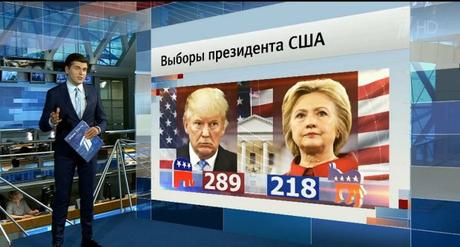
Stability: therein lies the fascination with American elections. Russians marvel at how Americans deal with constant change of leadership every four years, and the prospect of a different political party in power. While they are curious, it is not something most wish to adopt. The single brief period of truly free elections for the Russian people came soon after the collapse of the Soviet Union, and those were days of overwhelming disruption in every aspect of life from the availability of food, long periods between payment of salaries, changes in the political system, rampant crime, devaluation of currency, etc. Perhaps it is unfair, but most associate those memories with "democracy" and they do not wish to repeat those experiences.
In this political cycle there was unusual interest in America's presidential campaign. Following the lead of Vladimir Putin who intensely dislikes, perhaps despises would be a better description, both Barack Obama and Hillary Clinton, most Russians seemed to hope that anyone except Hillary be selected.
Donald Trump, not a traditional politician, reminds them more of wealthy Russian Oligarchs. Russians have a love/hate affair with their oligarchs, hating them for being crooks, but being immensely jealous yet prideful of their success and wealth.
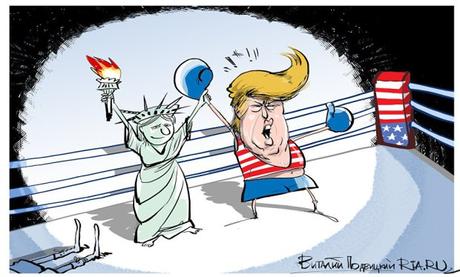
Like it or not, the election of American presidents does impact Russia. As just one example, with the election of Donald Trump, the Kremlin hopes that Western sanctions over the annexation of Crimea and Russia's war in Eastern Ukraine will be lessened, if not dropped altogether.
We should note that Ukrainians are hoping that a Trump administration might be more helpful than the current Washington government in assisting Ukraine against Russian aggression.
So, here is a peek at how Russian social media is digesting the USA election:
The image above was accompanied by a heavy dose of sarcasm with the headline that Trump was "gaining 146 % of the votes" an obvious dig at the Crimean referendum in which the Russian Federal Election Commission first published that the annexation succeeded with 146% of the votes. Embarrassed, the Kremlin later revised the totals to under 100%.
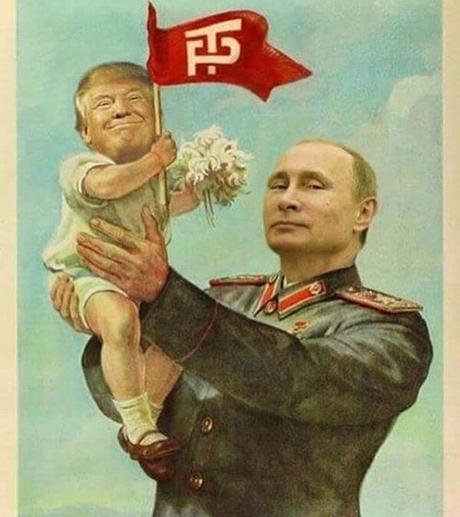
Many Western readers may not understand the next image:
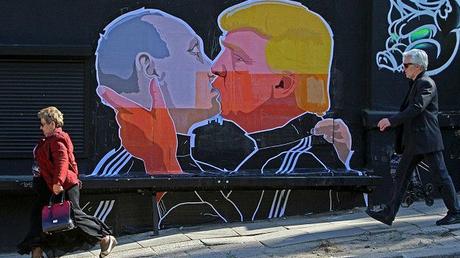
During the Soviet era two leaders embracing with a kiss was sometimes called the socialist fraternal kiss. Perhaps the most memorable instance came in 1979 when Soviet Premier Leonid Brezhnev kissed East German leader Erich Honecker in celebration of the thirtieth anniversary of the German Democratic Republic (East Germany).
The photo was circulated worldwide by the French magazine Paris Match in the late 1970s. Then, with the fall of the Berlin Wall in 1989, artists began to paint political messages on the few remaining sections of the wall. In 1990, artist Dmitri Vrubel painted a giant version of the photo and titled it the " The Kiss of Death."� Today you can still find it on display at Berlin's East Side Gallery.
On a more serious note, Russian president Vladimir Putin sent a message of congratulations to Donald Trump on his victory in the US presidential election on Wednesday, the day after the election. Mr. Putin expressed his desire to work together to lift Russian-US relations out of the current crisis, resolve issues of international interest, and look for effective responses to global security challenges.
(Jim Mendeleyev)
